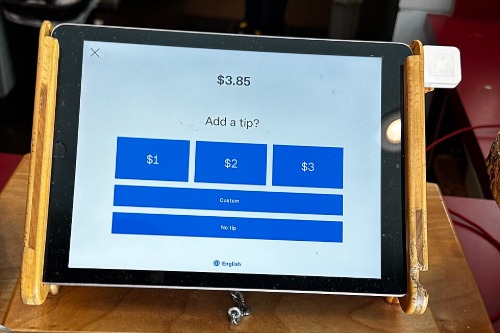1. Drinking Coffee All Day

Coffee is a 24/7 beverage in the U.S., with massive cups and constant refills. Americans sip it in the morning, at work, in meetings, and even late at night. But in countries like Italy or France, coffee is more of a ritual—small, quick, and usually enjoyed in the morning. Drinking a 20-ounce iced coffee at 3 PM might get you a puzzled look.
Others may silently judge it as overconsumption or stress-fueled behavior. The giant coffee culture can seem excessive to those used to sipping espresso at a café. While Americans see it as fuel, others view it as another sign of rushing through life. Still, no one says a word—they just sip their tiny espresso and move on.
2. Wearing Shoes Indoors

In many American homes, it’s totally normal to keep your shoes on all day—even while lounging on the couch. But in much of the world, particularly in Asia and parts of Europe, this is seen as dirty or disrespectful. Shoes are considered outdoor wear, and bringing them inside is a hygiene faux pas. Even some Americans are adopting the no-shoes rule at home, though it’s far from universal.
Despite this, people rarely confront someone about it. Instead, it becomes one of those subtle judgments—like thinking someone’s house is less clean or that they were raised differently. It’s a cultural norm that sticks out more abroad than at home. Still, it’s rarely discussed directly, which makes it even more awkward.
3. Eating Fast Food So Often

Fast food is a staple in the American diet, with nearly 1 in 3 adults eating it daily. For many, it’s about convenience and affordability. But outside the U.S., this habit can be seen as unhealthy, lazy, or even a symbol of overindulgence. Other cultures often emphasize home-cooked meals, even on busy days.
Americans might not realize how judged they are for this until they travel. Someone in France might see eating on the go as rushing through life. In places like Italy or Greece, meals are events meant to be savored—not scarfed down in a car. Yet no one will likely say anything; the judgment is just written on their faces.
4. Being Overly Friendly with Strangers

Smiling at strangers, striking up small talk in line, or complimenting someone’s outfit is normal in the U.S. Americans are known for their friendliness, and it often comes from a good place. But in many countries, this behavior is seen as intrusive or fake. People may wonder what your angle is or why you’re being so forward.
Even when people admire the warmth, they might question the sincerity. In countries like Germany or Finland, such openness is rare and reserved for close relationships. So while Americans see friendliness as polite, others might view it as boundary-crossing. Again, no one’s likely to mention it—just silently raise an eyebrow.
5. Working Too Much

The American grind culture is deeply rooted in the idea that hard work equals success. With limited vacation days and the glorification of hustle, many Americans end up working far more than their global peers. In countries like France or the Netherlands, long work hours are seen as inefficient, not admirable. Rest and leisure are valued just as much as productivity.
This leads to quiet judgment, especially when Americans brag about being busy. In many parts of the world, overwork suggests poor time management or misplaced priorities. But in the U.S., it’s often worn like a badge of honor. That disconnect creates a silent cultural critique that rarely gets addressed head-on.
6. Obsession with Personal Space

Americans tend to keep a large bubble of personal space, sometimes even in crowded places. Touching, hugging, or standing too close is often considered invasive. But in many cultures, closeness is normal and even expected—especially in Latin America, the Middle East, or Southern Europe. There, touching is a sign of warmth, not a threat.
So when Americans recoil or seem stiff, others may silently judge them as cold or standoffish. It’s not always a fair assessment, but it happens. This spatial norm is so ingrained that most people don’t even think about it until they travel. And even then, the judgment remains unspoken.
7. Having a Flag Everywhere

The U.S. flag shows up on front porches, clothing, bumper stickers, and even food packaging. Patriotism is deeply embedded in American identity, and many wear it with pride. But in other countries, such displays can be seen as extreme or nationalistic. In Germany or Japan, for instance, overt flag-waving is often avoided due to historical context.
People from these places may quietly judge Americans as overly patriotic or self-centered. They may question why someone needs to display their national pride so constantly. It’s rarely brought up directly, but it doesn’t go unnoticed. Even Americans abroad sometimes try to tone it down to avoid awkward stares.
8. Talking About Money Openly

In the U.S., it’s not uncommon for people to discuss their salaries, student loan debt, or how much they paid for a house. But in many other countries, that kind of financial openness is seen as gauche or even boastful. Americans often value transparency and individual achievement, but this can come off as bragging elsewhere. Even among themselves, there’s often unspoken discomfort about it.
That contradiction leads to subtle judgment. Someone might share how much they paid off in debt, thinking it’s inspiring, but others may silently think it’s oversharing. In more reserved cultures like Japan or Germany, money talk is strictly private. So even though it’s not always condemned out loud, it’s often quietly frowned upon.
9. Not Knowing Foreign Languages

Only about 20% of Americans speak a language other than English, compared to over 50% in Europe. This is partly due to geography and the dominance of English globally. But it’s also tied to how language education is prioritized in schools. Abroad, this often leads to quiet judgment about American ignorance or lack of curiosity.
People may think Americans are self-centered or expect the world to accommodate them. Even when they’re kind, there’s sometimes a tone of surprise when an American speaks another language fluently. It’s not always fair, but it’s a real perception. And it lingers quietly, without ever being explicitly addressed.
10. Tipping Culture

Americans are trained to tip—and tip big—in service settings, often leaving 15–25% for waitstaff, delivery drivers, and even baristas. But in many other countries, tipping is minimal or non-existent because service wages are structured differently. People abroad often see American tipping as confusing, excessive, or a sign of a broken system. Some even perceive it as performative or patronizing.
Still, when Americans travel and tip generously, they’re rarely told it’s unnecessary. Instead, they might get a polite smile and later be the subject of a quiet conversation. It’s one of those things where cultural expectations collide without ever being resolved. Everyone just nods and judges silently.
This post 10 Things Americans Get Judged For, But No One Ever Admits It was first published on American Charm.


